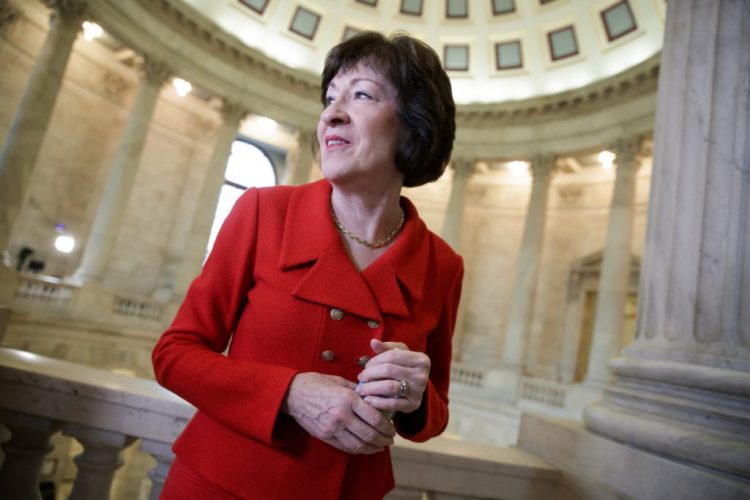Sen. Susan Collins raised $1.8 million toward a potential 2020 re-election bid in the last three months of 2018, the Maine Republican’s best quarter of fundraising ever.
The lucrative haul happened during the same quarter that Collins cast a high-profile vote in favor of Supreme Court nominee Brett Kavanaugh, a conservative who was narrowly confirmed amid controversy about allegations that he sexually assaulted a teen at a party in high school.
Amy Abbott, deputy treasurer of Collins for Senate, said the Kavanaugh vote “certainly generated enthusiasm and activism from both supporters and opponents of his nomination.”
Kavanaugh was confirmed on Oct. 6 in a 50-48 vote, two days after Collins gave a prominent speech on the Senate floor supporting the nomination.
The vote appears to have inspired a flood of political contributions both to Collins and a potential opponent.
A crowdfunding campaign inspired by her vote and organized by national and Maine liberal groups has raised $3.8 million for whichever candidate emerges from the 2020 Democratic primary to run against the senator. National Democrats are targeting Maine as a potential Senate pickup. Collins is now the sole Republican representing New England in the U.S. House or Senate.
First elected to the Senate in 1996, Collins has usually clobbered her Democratic opponents. She has said she is preparing to run for re-election, but hasn’t made a final decision on whether she will.
While no high-profile Democrats have announced, potential candidates include Maine House Speaker Sara Gideon and Susan Rice, national security adviser during the Obama administration.
Abbott said the Collins for Senate team stepped up fundraising efforts in the fourth quarter.
“We made an effort to have a strong quarter because we wanted to send the message that Senator Collins will be prepared to run a vigorous campaign in 2020. The response was even stronger than we expected, and we are very pleased with the results. The fact that we received donations from all 50 states, and that the average donation was $92, shows the breadth and depth of support that Senator Collins enjoys in Maine and across the country,” Abbott said in a statement. She said it was Collins’ highest quarterly fundraising total ever.
Collins raised a total of $2.9 million in 2017 and 2018.
Marie Follayttar Smith, executive director of progressive group Mainers for Accountable Leadership, which helped with the crowdfunding campaign against Collins, said the senator is now tied to President Trump and more vulnerable after numerous votes for legislation pushed by the conservative president.
“She can no longer be called a moderate,” Follayttar Smith said. “The people understand this is a very different Susan Collins than who they voted for (in 2014), and they deserve more from their elected officials.”
Collins declined to say whether she would endorse Trump in 2020 during an interview on the PBS NewsHour this week. Collins did not support Trump’s presidential bid in 2016.
Collins has taken high-profile votes for and against Trump’s legislative priorities. Most recently, Collins was one of six Republicans to break ranks and vote for a Democratic proposal to end the partial government shutdown without including money Trump sought to build a border wall. Collins also voted for the Republican plan to re-open government that included wall funding.
Aside from her Kavanaugh vote, Collins also voted for a Republican tax cut in late 2017. But she was one of three Republicans to buck the party and vote to save the Affordable Care Act in July, 2017.
Brian Duff, a political science professor at the University of New England, said Collins will be a formidable candidate, but Democrats have an opening.
“I do think there is a good chance Collins will have a much tougher race this year, despite her ample money on hand and good track record,” Duff said. “While her support for Brett Kavanaugh will bring some anger and emotion to the campaign to oust her, I think it is her vote for the tax bill that will actually cost her the most in the campaign.
“That bill, with its massive tax cuts for corporations and the very wealthy, is very unpopular. The effects she promised, like a bump for worker pay, and new investments by business, have not come to pass. The deficit has risen sharply as a result of the bill.”
But Duff said it’s unclear whether Democrats will find a candidate who can ‘make the case’ against Collins. Also, he said, much can happen between now and 2020, and the race could be affected by the economy and Trump’s approval rating.
Joe Lawlor can be contacted at 791-6376 or at:
jlawlor@pressherald.com
Twitter: joelawlorph
Send questions/comments to the editors.




Comments are no longer available on this story